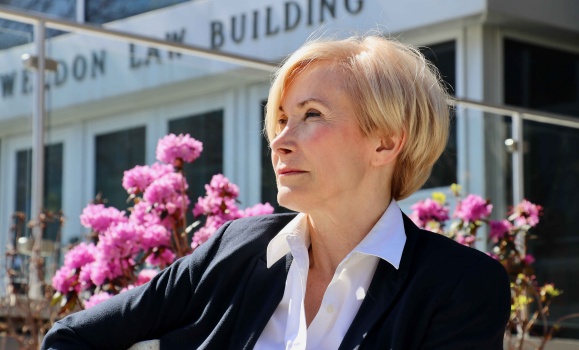News
» Go to news mainKUDOS! To Professor Faye Woodman on her retirement

Professor Faye Woodman joined our law school’s faculty in 1978. Over the years she taught many courses, including Property, Tax, Succession, Equity and Trust, Estate Planning, and Elder Law. As she prepares to retire, she reflects on what has changed, what she has learned, and what comes next.
How did your teaching style evolve over the years?
When I started it was Socratic (Q&A), and when I finished it was more discursive (conversational). I was teaching a lot of technical subjects, and I realized that before the students could talk about a subject, they needed to learn the basics, so I gave outlines in advance. It made conversations more fruitful and less stressful for the students. Also, at the beginning of my career I taught upper-year courses. Later I taught first years, which I loved. Those students were open and willing to embrace new approaches, which allowed me to be more personally engaged with them.
How have the students changed?
Students today are more globalized, sophisticated, and outward looking than when I began teaching. They also (mostly) accept gender equality. When I went to law school at Queen’s I didn’t have any female professors, and I was one of five women to graduate in a class of 120. Now more than half of our student body is female.
What are some of the lessons the students have taught you?
In a lot of areas of life, and sometimes even in law, many students knew more than I did. They had experience in different areas from working and volunteering. I was often startled about the things they knew and had done. Some of them are artists and singers, while others have dealt with personal challenges, such as substance abuse or a terminal illness. Some of my students were inspirations to me.
What do you feel is the law school’s greatest strength?
It has managed to maintain its national and international reputation for leadership and scholarship in the face of being in a small province and budget cuts.
Career-wise, what are you most proud of?
The research and teaching I did that emphasized the effect of income and wealth inequality. I think it’s the most important issue in our society. I’m also proud of my former students, some of whom went on to become cabinet ministers, artists, singers, and broadcasters, among other interesting careers, and good men and women.
What will you miss most?
The sense of community. I’ve made strong friendships with colleagues, staff, and students, especially at the beginning of my career when I was often younger than the students. Over the years, I’ve worked with people who have given a little extra – colleagues, support staff, custodians. Everyone has a story, and I’ll miss all of those stories.
What’s next?
I’m publishing a series of articles on the legal aspects of digital assets in a Canadian technology journal. Then, it’s a big adventure! I’ve been working full-time since 1972, so retirement is offering me a gift of time. I’m not going to try to replicate the past. I want to travel, volunteer, and live somewhere for a while where I can perfect my French.
Recent News
- Assistant Professor Liam McHugh‑Russell ft in "Dispute at B.C. ports may reignite over employers' push on automation: expert"
- Professor Emeritus Wayne MacKay ft in "Legal column: What's the legal line between freedom of expression and hate speech?"
- Professor Emeritus Wayne MacKay ft in "The Todd Veinotte Show, July 8, 2024"
- Standing Up For The World
- Professor Emeritus Wayne MacKay ft in "Victim believes hate motivated downtown Halifax attack: ‘People will be terrified to hold their partner’s hand walking down the street’"
- Professor Emeritus Jocelyn Downie ft in "Opinion: Forced transfers for assisted dying are cruelty cloaked as compassion"
- Professor Emeritus Wayne MacKay ft in "Be practical, not idealistic to scrap partial‑day plans: expert"
- Professor Emeritus Jocelyn Downie ft in "A British Columbia court challenge to end forced transfer for medical assistance in dying"
